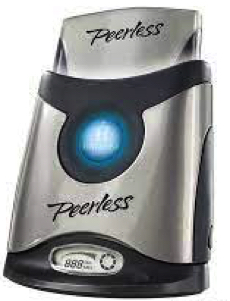History 2001: Iomega Peerless?
Not without help of IBM
By Jean Jacques Maleval | January 5, 2023 at 2:00 pmIomega’s entire history is built around disk drives with removable disks, whether Bernoulli, Zip and PocketZip floppies or Jaz HDDs.
Now the company is moving into removable HDDs, with a new line of products called Peerless, expected to be available in mid-2001 in the US.

The originality of the product line lies in the slot into which the 2.5-inch HDDs are inserted, which contains a considerable chunk of the electronics normally found on the controller card of the drives themselves, particularly the interface driver.
Consequently, in theory, at least, the “lite” drives designed for these sockets should cost less. They will sell for $130, $160 and $200 in capacities of 5, 10 and 20GB respectively. The base runs $250.
“IBM is supplier to us via their world class HDD technology. We use 2.5-inch HDD drive mechanisms from IBM however, Iomega is the first to separate out the electronics from the drive mechanism, creating a hermetically sealed disk that dramatically removes any data contamination issues. The products will be manufactured in Roy by Iomega. The Peerless disks are designed to withstand any damage from a 30- inch drop, or basically a desktop fall,” Chris Romoser, Iomega’s director of corporate communications, informed us.
The Peerless base will support different connectivity to the PC, first with USB 1.1 or Firewire, then at a later date, USB 2.0 and SCSI.
The company said that “the innovation here is Iomega’s integration of RW heads into fully sealed removable disks that eliminates the risk of dust contamination [the chief problem with the manufacturer’s Jaz and Zip product. -Ed.] and allows sustained transfer rates in the range of an expected 15MB/s with the Firewire module.”
Once again, the Utah-based company has surprised us. The real novelty of this announcement is the notion of HDDs that are less expensive due to the elimination of part of their internal electronics.
But will there in fact be a marked price difference? Today, a 10GB 2.5-inch IDE HOD from Toshiba runs from $112 to $150, while an IBM device ranges between $130 and $230, according to pricewatch.com. That’s compared to $159 for Iomega’s 10GB Peerless model, not counting, however, the indispensable $250 base unit.
In order to manufacture Peerless drives, Big Blue is planning a special production line, since the manufacturing process is different from that of its usual line of disks, and that will also add to the cost.
Packaging and proprietary connectivity so the little HDDs can fit the socket will add further cost.
In the recent history of the storage industry, a large number of firms have ventured into removable HDDs (Quantum, LaCie, VST, Datazone, Flotec, etc), without ever producing a veritable explosion.
The only truly interesting initiative in the area came, several years ago, from Compaq, which, with a few other firms, attempted to standardize a fixed-volume model with common connectivity always in the same place. It thus became possible to produce PCs with standard fittings, capable of accepting any standardized storage devices (HDD, CD, DVD) regardless of the manufacturer, without worrying about patents. Unfortunately, the idea never really took off.
What we really don’t understand is why, with its new Peerless device, Iomega would risk competing with several of its existing products? The typical user will now hesitate between the latest devices, on the one hand, and the costly (and slower) Jaz, Zip, CD-RW or MO units on the other.
Meanwhile, Iomega has another new initiative in the works, after signing an accord with I-Jam Multimedia LLC for the distribution of pre-recorded PocketZip disks. The media will be loaded with music, best-selling books, classic radio shows and digital magazines. Retail price will be $20 for music and $30 for books.
Once again, however, it’s hard to imagine how a 40MB diskette will be able to compete with the traditional 650MB CD-ROM.
This article is an abstract of news published on issue 157 on February 2001 from the former paper version of Computer Data Storage Newsletter.














 Subscribe to our free daily newsletter
Subscribe to our free daily newsletter


